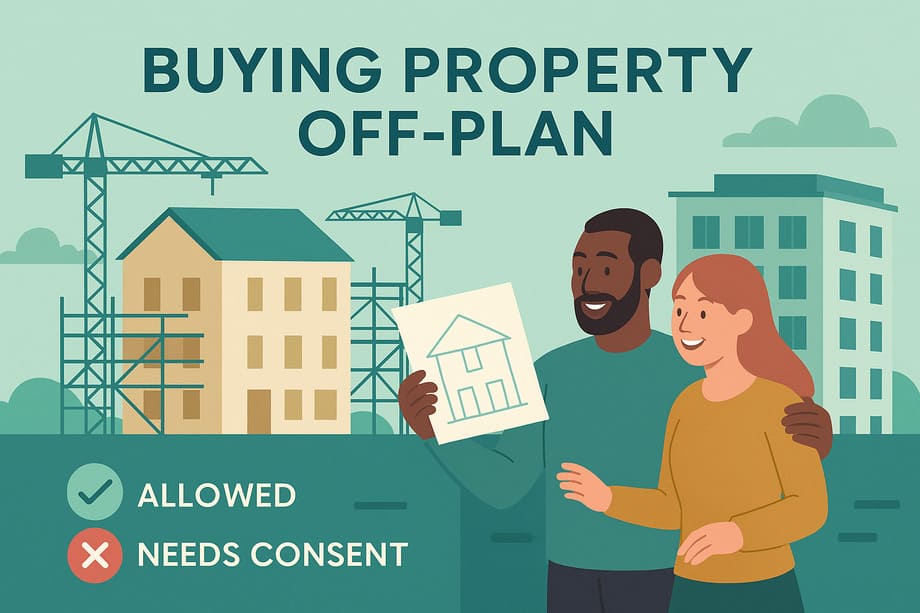The Essential Guide to Buying Property Off-Plan in the UK

Buying a home before construction is finished has become an increasingly attractive option for British property buyers. Whether you’re a first-time buyer searching for an affordable entry into the housing market or an investor seeking to maximise returns, understanding the intricacies of buying property off-plan can help you make informed decisions that align with your financial goals.
Understanding Off-Plan Property Buying
When you buy a property off-plan, you’re committing to purchase a home that hasn’t yet been completed. In some cases, construction may have barely begun, whilst in others, the building could be nearing completion. Essentially, you’re making your buying decision based on architectural drawings, computer-generated imagery, and specification documents rather than walking through a finished property.
This approach to buying property has evolved significantly over the past two decades. What was once predominantly the domain of overseas investors has now become a mainstream option for UK buyers across all demographics.
The Financial Advantages
Securing Below-Market Pricing
One of the most compelling reasons to consider buying off-plan is the potential for substantial savings. Developers frequently offer these properties at discounted rates, sometimes as much as 15-25% below anticipated market value upon completion. This pricing strategy helps builders secure early sales, which in turn assists with their development financing.
Consider this scenario: you agree to buy an apartment valued at £250,000 with a 12% early-buyer discount, bringing your purchase price down to £220,000. If property values rise during the construction period, you could see immediate equity gains the moment you take ownership.
Capital Appreciation Potential
Property values in the UK have historically trended upward over time. When you secure an off-plan property at today’s prices with completion scheduled months or even years ahead, you’re potentially benefiting from market growth during the construction period. This means the property could be worth more than your agreed purchase price by the time you receive the keys.
Flexible Payment Structures
Unlike traditional property purchases where you need the full deposit upfront, many off-plan developments allow you to pay in stages throughout the construction process. This instalment approach can ease the financial burden and make homeownership more accessible, particularly for those who are carefully managing their savings.
The Practical Benefits of Buying Off-Plan
Personalisation Opportunities
Modern properties come with modern tastes, and buying off-plan often gives you the chance to influence the final product. Depending on how early you purchase and the developer’s policies, you may be able to select from various options including:
- Kitchen unit styles and worktop finishes
- Bathroom fixtures and tile selections
- Flooring materials and carpeting
- Internal colour schemes
- Occasionally, minor layout modifications
This level of customisation means you can move into a home that truly reflects your preferences without needing to undertake costly renovations.
Move-In Ready Condition
Brand new properties require minimal maintenance in the early years. Everything from the boiler to the electrical systems will be newly installed and compliant with current building regulations. You won’t face the surprise repair costs that often accompany older properties, allowing you to budget with greater confidence.
Energy Efficiency and Running Costs
Contemporary building standards prioritise energy efficiency far more than properties built even a decade ago. New-build homes typically feature superior insulation, double or triple glazing, efficient heating systems, and sometimes renewable energy solutions. These features translate directly into lower utility bills and reduced environmental impact.
Warranty Protection
All new-build properties in the UK come with structural warranties, typically provided by organisations such as the National House Building Council or the Local Authority Building Control. These warranties usually cover structural defects for ten years, with more comprehensive coverage for the first two years. This protection offers peace of mind that simply doesn’t exist with older properties.
Priority Access to Desirable Developments
The UK faces a significant shortage of housing stock, with demand consistently outstripping supply in many areas. By buying off-plan, you gain access to properties before they reach the open market, giving you a competitive advantage. You can often select your preferred unit within a development, whether that’s a corner apartment with panoramic views or a ground-floor flat with garden access.
Understanding the Risks of Buying Off-Plan
Construction Delays
Building projects don’t always proceed according to schedule. Weather conditions, supply chain disruptions, labour shortages, or unforeseen site complications can all cause delays. These postponements create several potential complications:
Mortgage Offer Expiration: Most mortgage offers remain valid for six months. If construction extends beyond this period, you may need to reapply, potentially at different interest rates or under changed lending criteria.
Personal Circumstance Changes: Your life situation might change during extended delays. A job relocation, relationship changes, or shifting financial circumstances could make the original property purchase less suitable.
Market Fluctuations
Whilst property values often rise, they can also fall. If the market experiences a downturn between your contract exchange and completion, you could find yourself committed to buying a property now worth less than your agreed price. This situation can be particularly problematic if it affects your mortgage valuation.
Design Alterations
Developers occasionally make modifications to plans during construction. Whilst significant changes typically require buyer consent, smaller alterations might not. These could affect the property’s layout, specifications, or even views.
The Reality Gap
Computer-generated images and show homes represent idealised versions of properties. The finished product, whilst meeting contractual specifications, may not perfectly match your expectations. Aspects such as room size perception, natural light, or the quality of finishes might differ from what you envisioned.
The Step-by-Step Process for Buying Off-Plan
Step One: Research and Financial Preparation
Begin by assessing your financial position thoroughly. Speak with a mortgage broker who specialises in new-build properties, as not all lenders offer mortgages for buying off-plan. Understanding your borrowing capacity early prevents disappointment later.
Simultaneously, research developers carefully. Investigate their track record, visit completed developments if possible, and speak with previous buyers about their experiences. A developer’s reputation for quality and punctuality is invaluable information.
Step Two: Property Selection and Site Visits
Whilst you cannot view the actual property, you should:
- Visit the development site to assess the location and surrounding area
- Tour any show homes to understand build quality and finishing standards
- Thoroughly review all floor plans, specifications, and CGI representations
- Research local amenities, transport links, and future area developments
Step Three: Securing Mortgage Approval in Principle
Obtain a mortgage agreement in principle before proceeding further. This document demonstrates to developers that you’re a serious buyer with verified borrowing capacity. It also provides clarity about your budget limitations.
Step Four: Making Your Offer
Given that off-plan sales have reached decade-low levels recently, there may be room for negotiation. Don’t simply accept the asking price without discussion. Consider negotiating not just on price but also on:
- Included upgrades or personalisation options
- Payment schedules
- Completion timelines
- Incentive packages
Step Five: Paying the Reservation Fee
Once your offer is accepted, you’ll typically pay a reservation fee ranging from £500 to £2,000. This secures the property for you but is usually non-refundable if you withdraw. Before paying, ensure you’ve received and reviewed:
- Detailed floor plans with precise measurements
- Complete specification documents
- A clear timeline for construction completion
Step Six: Appointing Legal Representation
Select a conveyancing solicitor with specific experience in off-plan transactions. Do not feel pressured to use the developer’s recommended legal firm, as your solicitor’s primary duty is protecting your interests. An experienced professional will ensure your contract includes crucial protections.
Step Seven: Formal Mortgage Application
With your reservation in place, submit your full mortgage application promptly. Buying off-plan typically requires contract exchange within 28 days of reservation, leaving limited time for mortgage processing.
Step Eight: Contract Exchange and Deposit Payment
At exchange, you’ll sign the purchase contract and pay your deposit, typically 10% of the purchase price. This creates a legally binding commitment to purchase. Your solicitor should ensure the contract includes:
A Long-Stop Completion Date: This critical clause sets a final deadline for completion. If the developer fails to complete by this date, you can withdraw from the purchase and recover your deposit. Ensure this date precedes your mortgage offer expiry.
Price Lock Provisions: Clarify whether your purchase price is fixed at exchange and understand what happens if property values fluctuate before completion.
Specification Guarantees: The contract should detail exactly what’s included and limit the developer’s ability to make alterations without your consent.
Step Nine: The Waiting Period
During construction, maintain regular contact with the developer for progress updates. Some developers offer site visits at various stages, allowing you to see your property taking shape.
Step Ten: Pre-Completion Inspection
If buying from a developer signed up to the New Homes Quality Code, you’re entitled to a professional pre-completion inspection. This snagging survey identifies any defects or incomplete work that require rectification before you take ownership. Issues might include:
- Cosmetic imperfections in paintwork or tiling
- Poorly fitted fixtures or fittings
- Missing or incorrect specifications
- Structural concerns
All identified problems should be documented and resolved by the developer before completion proceeds.
Step Eleven: Completion Day
When the property is finished, the developer serves completion notice, typically requiring completion within 10 working days. On completion day, you’ll:
- Pay the remaining balance (via your mortgage and any additional savings)
- Pay applicable stamp duty
- Receive the property keys
- Take legal ownership
Step Twelve: Post-Completion Inspection
Even after a pre-completion inspection, conduct another thorough snagging survey after moving in. Living in the property often reveals issues that weren’t apparent during a brief inspection visit.
Mortgage Considerations for Buying Off-Plan
Securing finance for buying a property off-plan presents unique challenges compared to standard property purchases.
Lender Restrictions
Not all mortgage providers offer products suitable for buying off-plan. Some lenders have concerns about:
- The property’s uncertain completion date
- Potential market value changes before completion
- The property not yet existing for physical valuation
Deposit Requirements
Whilst standard properties might accept deposits as low as 5-10%, buying off-plan often requires larger deposits, sometimes 20-30%. However, schemes such as Deposit Unlock can help reduce this requirement for eligible buyers.
Offer Validity Periods
Standard mortgage offers typically remain valid for six months. However, some lenders offer extended validity periods specifically for new-build purchases, sometimes up to nine months. Specialist mortgage brokers understand which lenders provide these extended products.
Valuation Processes
Lenders will arrange valuations based on the development plans and specifications rather than a physical inspection. This means the valuer must assess whether the property will be worth the agreed price upon completion based on projected market conditions and comparable properties.
Stamp Duty Implications
Your stamp duty liability is calculated based on your agreed purchase price at reservation, not the property’s value at completion. For transactions in England and Northern Ireland:
- First-time buyers pay no stamp duty on properties up to £425,000
- Properties between £425,001 and £625,000 incur 5% duty only on the amount exceeding £425,000
- Properties above £625,000 follow standard stamp duty rates
Remember to account for stamp duty in your overall budget planning, as this represents a significant additional cost payable at completion.
Critical Questions to Ask Before Buying Off-Plan
Before committing to buying a property off-plan, obtain clear answers to these essential questions:
About the Timeline
- What is the anticipated completion date?
- What contingencies exist if completion is delayed?
- Will you agree to a long-stop completion date in the contract?
- If this is part of a larger development, how long will surrounding construction continue?
About Your Property
- What exactly is included in the purchase price?
- Which specifications are guaranteed and which might change?
- What personalisation options are available and at what cost?
- What documentation will be provided at completion?
About Financial Protection
- How is my deposit protected?
- What happens if the developer encounters financial difficulties?
- What warranties and guarantees come with the property?
- What is the service charge structure for apartments?
- For leasehold properties, what are the ground rent and lease length?
About Professional Advisers
- Can I choose my own solicitor and mortgage broker?
- If you recommend specific professionals, do they receive any incentives from you?
About the Development
- What amenities will be provided within the development?
- What council tax band will the property fall into?
- Are there any restrictive covenants or unusual lease conditions?
- What communal facilities will be available and who maintains them?
Leasehold Considerations When Buying Off-Plan
Many off-plan apartments are sold as leasehold properties. Pay particular attention to:
Lease Length
Ensure the lease is sufficiently long (ideally 125+ years). Shorter leases can make properties difficult to sell and expensive to extend later.
Ground Rent
Understand the annual ground rent charge and whether it escalates over time. Be cautious of properties with doubling ground rent clauses, which can make properties virtually unmortgageable.
Service Charges
Clarify what the service charge covers, how much it will be, and how increases are calculated. Ensure charges are reasonable and proportionate to the services provided.
Management Company
Understand who will manage the building and what oversight exists over management quality and cost control.
Maximising Your Off-Plan Property Investment
Location Analysis
Successful property investment begins with location selection. Research areas with:
- Strong employment prospects and economic growth
- Planned infrastructure improvements (new transport links, schools, or commercial developments)
- High rental demand if you’re buying to let
- Balanced supply and demand dynamics
- Positive long-term growth indicators
Development Selection
Not all developments are created equal. Prioritise those with:
- Reputable developers with proven delivery track records
- Realistic and well-planned construction timelines
- Thoughtful design appropriate to the local market
- Quality specifications and finishes
- Good transport connectivity and local amenities
Timing Your Purchase
Consider buying early in the development marketing phase when discounts tend to be most generous. However, balance this against the longer wait time before completion.
Who Should Consider Buying Off-Plan?
First-Time Buyers
Buying off-plan can work exceptionally well for first-time buyers because:
- Entry prices may be lower than equivalent second-hand properties
- Government schemes like Help to Buy (where still available) often apply
- Payment structures can ease the path to ownership
- New properties require less immediate maintenance spending
Property Investors
Investors are drawn to buying off-plan for:
- Below-market-value purchasing opportunities
- Capital appreciation potential during construction
- High rental demand for modern properties
- Low initial maintenance requirements
- The ability to purchase multiple units in attractive developments
Downsizers
Those looking to reduce their living space might find buying off-plan apartments appealing because:
- Everything is brand new and requires no work
- Energy efficiency reduces running costs
- Modern developments often include desirable amenities
- Communal maintenance is handled by management companies
Common Pitfalls to Avoid When Buying Off-Plan
Rushing the Decision
The 28-day period between reservation and exchange creates pressure, but don’t let it force hasty decisions. If you’re uncertain about any aspect of buying the property, pause and seek clarification.
Neglecting Due Diligence
Always conduct thorough research on the developer, even if they’re recommended by your estate agent or financial adviser. Their track record matters enormously.
Skipping Independent Legal Advice
Never use a developer’s recommended solicitor without first comparing alternatives. Your legal representative should be completely independent and focused solely on protecting your interests.
Underestimating Total Costs
Beyond the purchase price, budget for:
- Stamp duty
- Legal fees
- Mortgage arrangement fees
- Survey and snagging inspection costs
- Furnishing and moving costs
- Ongoing service charges and ground rent (for leasehold)
Assuming Completion Dates Are Guaranteed
Construction projects regularly run behind schedule. Don’t make binding commitments (such as giving notice on rental properties or selling your existing home) based on estimated completion dates without substantial buffer periods.
Ignoring Market Conditions
Whilst buying off-plan can offer excellent value, ensure you’re buying during appropriate market conditions. Be particularly cautious when buying near market peaks, as any subsequent downturn will be magnified by the time lag between exchange and completion.
Frequently Asked Questions About Buying Property Off-Plan
Can I withdraw from buying off-plan after exchanging contracts?
Once you’ve exchanged contracts and paid your deposit, you’re legally bound to complete the purchase. Withdrawing would result in losing your deposit and potentially facing legal action from the developer. This is why the long-stop completion date is so crucial, as it provides your only legitimate exit route if construction significantly overruns.
What happens if the developer goes into administration?
This is why deposit protection is essential. Ensure your deposit is held in a secure client account or protected through an insurance scheme. If the developer faces financial difficulties, the NHBC warranty may provide some protection, but the situation can become complex. This risk underscores the importance of researching developer financial stability beforehand.
Will I definitely get a mortgage closer to completion?
Not necessarily. Your mortgage offer depends on your financial circumstances at application and the property’s valuation at that time. If your income decreases, you take on additional debt, or the property value drops below the agreed price, your mortgage application could be declined or reduced. This is another reason why the long-stop date proves crucial.
Can I rent out my off-plan property?
This depends on the property type and lease terms. Some developments restrict letting, particularly in the early years. Check the lease carefully and discuss your intentions with your solicitor. If you’re buying specifically as an investment, ensure the lease permits letting before proceeding.
How much can I expect property values to increase during construction?
There are no guarantees regarding property value increases. Whilst historical trends show property price growth over time, short-term fluctuations occur. A conservative approach assumes minimal growth rather than counting on substantial appreciation. Any increase becomes a bonus rather than an expectation.
Are off-plan properties suitable for everyone?
Buying off-plan suits those who:
- Have stable financial circumstances unlikely to change
- Can wait months or years before moving in
- Accept some uncertainty regarding exact specifications
- Have researched thoroughly and understand the risks
- Have sufficient financial buffer for potential complications
They’re less suitable for those needing immediate accommodation or those with uncertain income prospects.
How do I know if I’m getting good value?
Compare the off-plan price against:
- Similar completed properties in the same area
- The developer’s pricing on previous phases
- Current market conditions and trends
- The discount being offered
Instruct your surveyor to provide a detailed valuation report assessing whether the property represents fair value at the agreed price.
What if the finished property doesn’t match the show home?
Show homes are often dressed to a higher specification than standard properties, including upgraded kitchens, premium flooring, and professional staging. Your contract should clearly specify what’s included as standard. If the completed property doesn’t match the contractual specifications, you have grounds to demand rectification or compensation.
Making Your Final Decision on Buying Off-Plan
Buying property off-plan can be an excellent strategy for securing a new home or investment property at advantageous prices. The potential for capital appreciation, combined with the benefits of brand-new construction, makes this approach attractive to many buyers.
However, success requires thorough preparation, careful research, and realistic expectations. Don’t rush into buying off-plan without fully understanding the process, the risks, and your own circumstances.
Take time to:
- Assess your financial stability and future plans
- Research developers comprehensively
- Understand all contractual terms and protections
- Engage experienced professional advisers
- Calculate total costs accurately
- Maintain realistic expectations about timelines and outcomes
When approached with proper diligence and professional guidance, buying off-plan can deliver excellent results. The key lies in making informed decisions based on thorough research rather than being swayed solely by marketing promises or fear of missing out.
Armed with the knowledge from this guide, you’re better positioned to determine whether buying property off-plan aligns with your circumstances and goals. Remember that every property purchase represents a significant commitment, and buying off-plan carries unique characteristics that demand careful consideration.
Whether you’re taking your first step onto the property ladder or expanding an investment portfolio, understanding how to buy off-plan thoroughly helps ensure you make decisions that serve your long-term interests and financial wellbeing.
Last Updated on October 15, 2025 by James Cartwright







